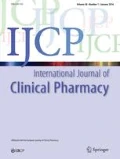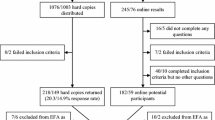Abstract
Background There is a large amount of research into and promotion of rational prescribing, but there is a comparative lack of investigation into deprescribing. The success of deprescribing is likely to be dependent on both medical and patient factors. Objective The aim of this study was to develop and validate a tool to capture the views and beliefs of patients regarding cessation of medications. Setting Participants were recruited from a multidisciplinary clinic at the Royal Adelaide Hospital and Hampstead Rehabilitation Centre. Methods The patients’ attitudes towards deprescribing (PATD) questionnaire was developed through expert opinion and piloting. Psychometric testing included face, content and criterion validity, sensitivity and test–retest reliability. Results A final 15 item questionnaire was produced. Through piloting, expert review and gamma rank correlation with the previously validated beliefs about medicines questionnaire, the PATD was determined to be valid. Test-retesting resulted in a total concordance of 71.3 % (95 % confidence interval, 64.1–78.5 %). Conclusion The PATD has acceptable psychometric properties and has potential for future use in research and practice to not only determine patients’ willingness towards deprescribing, but also uncover what beliefs may influence this.
Similar content being viewed by others
References
Dedhiya SD, Hancock E, Craig BA, Doebbeling CC, Thomas J. Incident use and outcomes associated with potentially inappropriate medication use in older adults. Am J Geriatr Pharmacother. 2010;8:562–70.
Sorensen L, Stokes JA, Purdie DM, Woodward M, Roberts MS. Medication management at home: medication-related risk factors associated with poor health outcomes. Age Ageing. 2005;34:626–32.
Fialova D, Topinkova E, Gambassi G, Finne-Soveri H, Jonsson PV, Carpenter I, et al. Potentially inappropriate medication use among elderly home care patients in Europe. JAMA. 2005;293:1348–58.
Barat I, Andreasen F, Damsgaard EM. Drug therapy in the elderly: what doctors believe and patients actually do. Br J Clin Pharmacol. 2001;51:615–22.
Claxton AJ, Cramer J, Pierce C. A systematic review of the associations between dose regimens and medication compliance. Clin Ther. 2001;23:1296–310.
Nordin OI, Runnamo R, Engfeldt P. Medication quality and quality of life in the elderly, a cohort study. Health Qual Life Outcomes. 2011;9:95.
Beers MH. Explicit criteria for determining potentially inappropriate medication use by the elderly: an update. Arch Intern Med. 1997;157:1531–6.
Hanlon JT, Schmader KE, Samsa GP, Weinberger M, Uttech KM, Lewis IK, et al. A method for assessing drug therapy appropriateness. J Clin Epidemiol. 1992;45:1045–51.
Fick DM, Cooper JW, Wade WE, Waller JL, Maclean R, Beers MH. Updating the beers criteria for potentially in appropriate medication use in older adults. Arch Intern Med. 2003;163:2716–24.
O’Mahony D, Gallagher PF. Inappropriate prescribing in the older population: need for new criteria. Age Ageing. 2008;37:138–41.
Kaur S, Mitchell G, Vitetta L, Roberts MS. Interventions that can reduce inappropriate prescribing in the elderly: a systematic review. Drugs Aging. 2009;26:1013–28.
Brulhart M, Wermeille J. Multidisciplinary medication review: evaluation of a pharmaceutical care model for nursing homes. Int J Clin Pharm. 2011;33:549–57.
Woodward M. Deprescribing: achieving better health outcomes for older people through reducing medications. JPPR. 2003;33:323–8.
Alexander GC, Sayla MA, Holmes HM, Sachs GA. Prioritizing and stopping prescription medicines. Can Med Assoc J. 2006;174:1083–4.
Williams A, Manias E, Walker R. Interventions to improve medication adherence in people with multiple chronic conditions: a systematic review. J Adv Nurs. 2008;63:132–43.
Carder PC, Vuckovic N, Green CA. Negotiating medications: patient perceptions of long-term medication use. J Clin Pharm Ther. 2003;28:409–17.
Peat JK, Mellis C, Williams K, Xuan W. Validity. Health science research. London, UK: SAGE Publications, Ltd; 2002. p. 105–13. ISBN: 9780761974031.
Dolovich L, Nair K, Sellors C, Lohfeld L, Lee A, Levine M. Do patients’ expectations influence their use of medications? Qualitative study. Can Fam Physician. 2008;54:384–93.
Barter G, Cormack M. The long-term use of benzodiazepines: patients’ views, accounts and experiences. Fam Pract. 1996;13:491–7.
King MB, Gabe J, Williams P, Rodrigo EK. Long term use of benzodiazepines: the views of patients. Br J Gen Pract. 1990;40:194–6.
Boath EH, Blenkinsopp A. The rise and rise of proton pump inhibitor drugs: patients’ perspectives. Soc Sci Med. 1997;45:1571–9.
Horne R, Weinman J, Hankins M. The beliefs about medicines questionnaire: the development and evaluation of a new method for assessing the cognitive representation of medication. Psychol Health. 1999;14:1–24.
Jyrkkä J, Enlund H, Korhonen MJ, Sulkava R, Hartikainen S. Patterns of drug use and factors associated with polypharmacy and excessive polypharmacy in elderly persons: results of the Kuopio 75+ study: a cross-sectional analysis. Drugs Aging. 2009;26:493–503.
Garfinkel D, Mangin D. Feasibility study of a systematic approach for discontinuation of multiple medications in older adults: addressing polypharmacy. Arch Intern Med. 2010;170:1648–54.
Williams ME, Pulliam CC, Hunter R, Johnson TM, Owens JE, Kincaid J, et al. The short-term effect of interdisciplinary medication review on function and cost in ambulatory elderly people. J Am Geriatr Soc. 2004;52:93–8.
Acknowledgments
We would like to thank the staff of the Multidisciplinary Ambulatory Consulting Service at the Royal Adelaide Hospital and the pharmacists at the Hampstead Rehabilitation Centre for their assistance with this study. We acknowledge the contribution made by the members of the RAH Pharmacology Department Journal Club for their insights in the development of the PATD. And finally we would like to thank all of the participants, especially those in the piloting phase who provided us with invaluable feedback.
Funding
Ms Emily Reeve’s PhD candidacy (of which this research was conducted within) is funded by an Australian Postgraduate Award (APA).
Conflicts of interest
None.
Author information
Authors and Affiliations
Corresponding author
Additional information
Full copies of the PATD Questionnaire are available from http://www.unisa.edu.au/Research/Sansom-Institute-for-Health-Research/Research-at-the-Sansom/Research-Concentrations/Therapeutics-and-Pharmaceutical-Science/#projects or from the corresponding author.
Rights and permissions
About this article
Cite this article
Reeve, E., Shakib, S., Hendrix, I. et al. Development and validation of the patients’ attitudes towards deprescribing (PATD) questionnaire. Int J Clin Pharm 35, 51–56 (2013). https://doi.org/10.1007/s11096-012-9704-5
Received:
Accepted:
Published:
Issue Date:
DOI: https://doi.org/10.1007/s11096-012-9704-5




